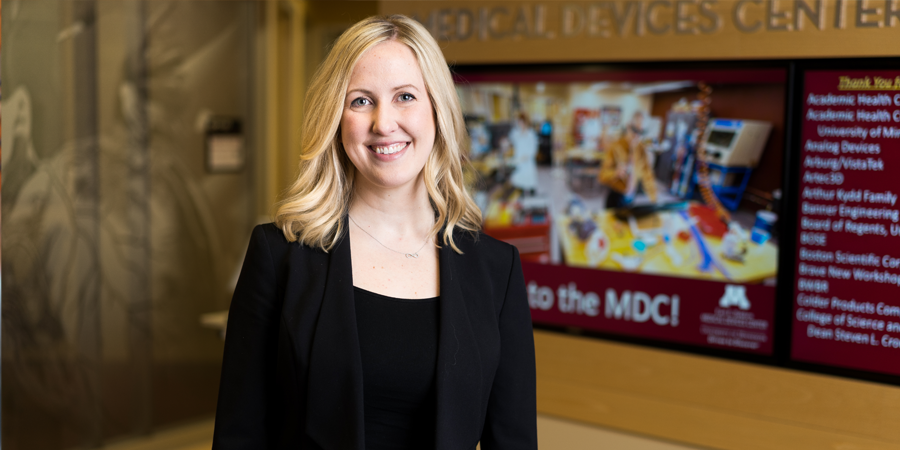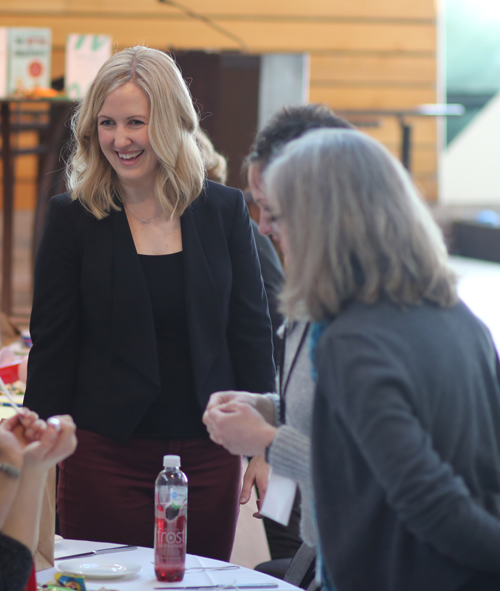Follow her lead
June 3, 2019

As the first School of Nursing graduate to earn a spot in the Earl E. Bakken Medical Devices Center Innovation Fellows Program, Amy Hoelscher is keen on carrying the legacy of nursing innovation forward.
Before Amy Hoelscher, DNP, RN, CPXP, could inspire her fellow nurses about the future of the profession, she needed to ground herself in the past.
So the two-time School of Nursing graduate returned to her alma mater in search of historical context for her presentation on cultivating creativity and innovation at this year’s Planting Seeds of Innovation Conference. As she paged through volumes of the American Journal of Nursing from the early 1900s in the school’s collection, she saw scores of inventions created by nurses, from a device for heating bathtubs that lacked access to hot water to a specialized stretcher for transporting patients with typhoid fever.
Innovation, it turns out, is nothing new in nursing.
“They saw a patient need and they created something to fix it,” she says. “We have this really rich history of being innovators that I didn’t know about.”
As the first School of Nursing graduate to earn a spot in the Earl E. Bakken Medical Devices Center Innovation Fellows Program, Hoelscher is keen on carrying that legacy forward.
The one-year, immersive Innovation Fellows Program, which launched in 2008, brings together professionals from across health care, bioscience and engineering to create novel and needed medical devices and develop future leaders in the medical technology industry.
It’s a fresh challenge for Hoelscher, who previously spent a decade as a nurse in the neonatal intensive care unit at Children’s Minnesota in Minneapolis.
“I’m interested in innovation and how we can do health care differently,” says Hoelscher, who earned a Bachelor of Science in Nursing degree in 2008 and a Doctor of Nursing Practice degree in 2017. “What are things that we can work on?”
Beyond bedside

Hoelscher was perfectly content in the neonatal intensive care unit, where she had first volunteered as an undergraduate student. She loved witnessing the resilience of newborns, watching parents build confidence and providing support to families during vulnerable moments.
“I thought that was what I was going to do for life,” says Hoelscher, who grew up in Rockford, Minnesota.
But then a colleague encouraged her to participate in the hospital’s evidence-based practice scholars program, in which frontline staff explore issues that are relevant to their day-to-day work by researching academic literature.
For Hoelscher, who researched the effects of lighting on babies in neonatal intensive care units, the experience tapped into her natural curiosity and left her wanting more. Her quest eventually led her to the School of Nursing’s Doctor of Nursing Practice program, where she specialized in Health Innovation and Leadership.
“There’s a lot that I gained over those three years. Obviously the skills, knowledge and experiences to help move from bedside into other practices and the confidence to better lead health care into the future,” says Hoelscher, who also completed certificates in Health Care Design and Innovation and Leadership in Health Information Technology for Health Professionals.
“There’s a really strong community within the Health Innovation and Leadership group with people of diverse backgrounds and areas of work,” says Hoelscher “So there’s a community that you can really draw on and ask questions of and really be open with each other. For the rest of my career, I’ll have these people that I can connect with.”
Seeking innovation
The thought of taking an idea for a medical innovation beyond merely a recommendation and into multiple iterations of prototypes drew Hoelscher to the fellows program.
She and the rest of this year’s class—two biomedical engineers and two physicians—got a one-month crash course in the medical technology landscape, U.S. Food and Drug Administration regulations, potential investors and more. Then they visited area clinics, operating rooms and hospital units to identify gaps and opportunities.
“Sometimes innovation might start with, ‘We have this cool new technology. How do we roll that out and where can it be useful?’” says Hoelscher, who’s specifically focusing on inpatient mobility for older adults. “And we really were focused on, ‘What are those needs we’re identifying? And how do we devise a solution around that need?’”
By design, each member of the interdisciplinary group of fellows approaches those clinical needs from a unique perspective. Hoelscher says working with and learning from the other fellows has been one of her favorite parts of the experience, which wraps up at the end of May
“As much as I love bedside care and working with patients, part of getting my graduate degree was to be able to have a broader impact on patient care,” she says. “And whatever my next role is, I’ll be bringing that innovation component and championing it for nurses.”